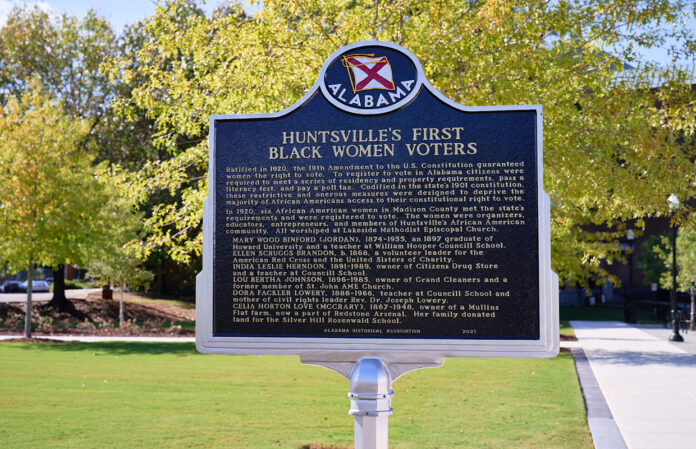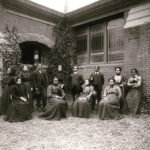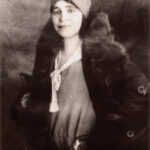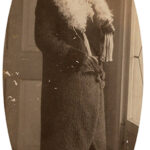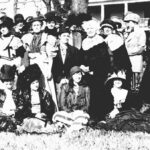On Wednesday, February 16, in honor of Black History Month, six black women from Madison County will be immortalized in a formal presentation sponsored by the Historic Huntsville Foundation and held at the Huntsville Area Association of Realtors recognizing the historic role they played in women’s voting rights.
The ceremony known as Hidden Figures No Longer: Six Black Women Who Made History highlight Mary Wood Binford, Ellen Scruggs Brandon, India Leslie Herndon, Lou Bertha Johnson, Dora Fackler Lowery and Celia Horton Love were the first black women to register, and the first to vote in Madison County in 1920.
The women were part of a larger movement known at the time as the Huntsville Equal Suffrage Association (HESA) and they were affluent, educated, and married to influential men held in high esteem by the white community.
A marker has already been placed at Councill High Memorial Park and at the former Adams Street home of Alice Baldridge in their honor.
According to the history recorded by HHF’s executive director, Donna Castellano, Huntsville’s suffrage movement began in 1895 with Susan B. Anthony and Carrie Chapman Catt speaking to an overflow crowd in Huntsville’s City Hall, which led to the formation of HESA.
In 1895, black women understood the importance of the right to vote as a means for securing the safety of their families. However, Alabamians overwhelmingly believed politics was the domain of men and the majority of people were against it. As a result, the issue simmered until 1912 when energized by the success of Women’s Suffrage on a national level, HESA reconvened.
Nearly 20 years later, they still struggled to find a meeting place because the issue was so controversial, but HESA president Ellelee Humes volunteered her McClung Avenue house.
“After the ratification of the 19th Amendment in August 1920, Alabama officials began registering qualified women to vote for the upcoming 1920 presidential election,” said Castellano. “Within two months, 123,000 Alabama women registered, including 1,383 from Madison County, of whom six were Black. Fewer than 200 Black women qualified to register in Alabama.”
“These six Black women were the daughters and granddaughters of formerly enslaved people who had established a foothold of success in the decades following slavery,” added Castellano. “All the women had formal educations.”
Henry C. Binford, Sr., the father-in-law of Mary Binford; and Daniel Brandon, the husband of Ellen Brandon, held elected office before most Blacks were stripped of voting rights in 1901.
Mary Binford and her husband, Henry C. Binford, Jr. both graduated from Howard University. Henry retired as the principal of Councill High in 1918 and Binford, Brandon, Herndon, and Lowery taught at the school eventually named for William Hooper Councill.
According to Castellano’s record, the women and their husbands were also active members of Huntsville’s black business community.
Ellen and Daniel Brandon owned a successful construction company. Lou Bertha and Shelby Johnson owned Grand Shine Parlor, a dry-cleaning business; India and A. J. Herndon owned Citizens Drug Store; and Dora and Leroy Lowery owned businesses in the Church Street business district.
Leroy Lowery also served on the Board of the Supreme Life Insurance Company of Illinois; and Celia Love owned a large farm in Mullen’s Flat where Redstone Arsenal stands today. Her husband, Adolphus Love, was reputed to be the wealthiest black man in Madison County.
The women were philanthropic, committed to serving their community and were members of Lakeside Methodist Church, a hub of spiritual, cultural, and educational activities in the black community.
In 1965 with the passage of the Voting Rights Act, all Alabama men and women gained the right to vote and Huntsville native Rev. Joseph Lowery, a founder of the Southern Christian Leadership Conference and son of Dora Lowery, guided the effort.
The Hidden Figures No Longer: Six Black Women Who Made History presentation is February 16 at 6:00 p.m. at HAAR located at 535 Monroe Street downtown.
Thank you to Donna Castellano at the Historic Huntsville Foundation for her written record of these historic women and HESA.
Don’t miss out! Subscribe to our email newsletter to have all our smart stories delivered to your inbox.


